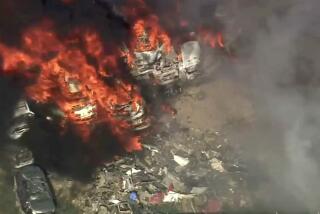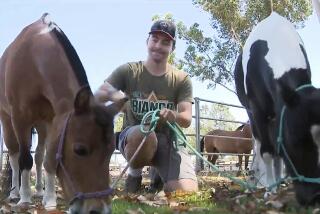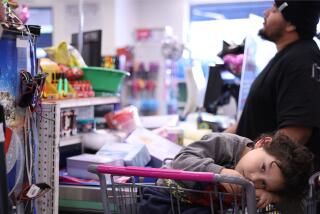Pessimistic Escondido Optimists Shut Recycling Yard : Civic affairs: Sloppy bookkeeping in past leads to the demise of a cash-for-trash center after 18 years.
- Share via
After officers of the Noon Optimist Club toted up the financial facts for their recycling yard in Escondido this week, pessimism was the bottom line.
“It was the only thing we could do,” club president Stan Oleksy said with a sigh. “We had to shut it down.”
The salvage yard at 1180 W. Washington was the chief source of club income for 18 years, financing dozens of Optimist projects. For its customers, the dimes and dollars that the yard paid for paper, plastic and aluminum cans went to youth groups and schools to finance special events and recreational programs.
The club issued a two-page statement--half eulogy, half obituary--to announce that the yard would no longer be operated by the Noon Optimist Club and will be closed until another operator is found.
The only bright spot Oleksy could find in the dark picture were calls from four companies seeking to buy, lease or operate the salvage center. Two club members, Alan Biery and Ron Haines, have been appointed to negotiate with the interested groups.
The club first discovered that it had problems with its recycling center early last year and tried to stabilize the operation by firing the manager, Ted Vessels, who had operated the center with little interference from club members since 1974.
Hit-and-miss bookkeeping and missing records caused auditors brought in to balance the books to throw up their hands in frustration. The recycling center did most of its business in small cash amounts that accountants found impossible to trace.
Oleksy said there was no evidence to support early concerns that there might have been misappropriations of the Optimists’ share of the center profits. But he said there was no evidence that proper payroll deductions were made for workers or that company contributions to state agencies were ever paid.
Whether the club is responsible for the lapses in the operation of the recycling center is a matter that the club’s attorney--and probably a few government agencies--is looking into, Oleksy said.
Since March, when the club began to oversee the recycling center’s operations, implementing a new payroll system and a proper accounting procedure, the center’s financial picture has gone from bad to worse, Oleksy said.
At the first of last year, the center had $104,000, but, by June 30, it posted a $40,000 loss. By August, another $30,000 in red ink was added; by Jan. 10, “there was just enough money left to pay off the workers.”
Club members had hoped to make a financial turnaround by keeping the center open and accepting “donations” of recyclable materials instead of paying for the materials. But the trickle of donations was not enough, Oleksy said, “and we weren’t making enough to pay even a skeleton crew and pay the rent.”
The center’s death sentence came Tuesday when an Optimist committee gathered to discuss alternatives.
“There weren’t any,” Oleksy said. Although the center had been making a modest, almost marginal profit since club officers took over its operation last August, it was too late to build back up the $100,000-$150,000 operating fund that the center required for its daily buying and selling.
“Continued operation of the center was not a viable option,” he said. “Financially, it was utterly impossible.”
Oleksy now must find another way to earn money to support the club’s charitable programs, which include more than a dozen youth activities, the Blind Olympics, Meals on Wheels, special school recognition programs and other senior citizen aids. The president said that members are kicking around fund-raising possibilities. The one he tends to favor would have club members collect recyclables to be sold at someone else’s salvage yard.
“That way, we could get the income without all the hassle of running the business,” he said.
More to Read
Sign up for Essential California
The most important California stories and recommendations in your inbox every morning.
You may occasionally receive promotional content from the Los Angeles Times.













